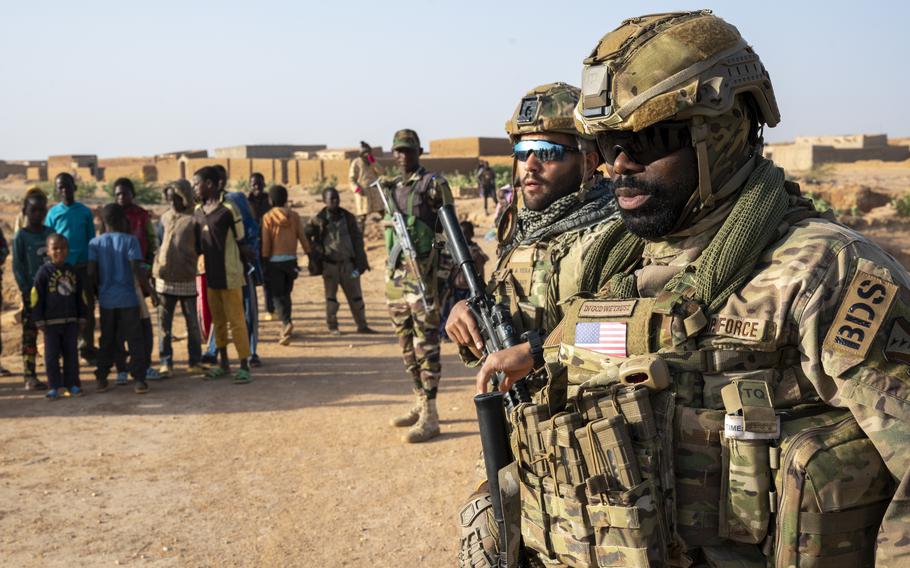
U.S. Air Force Staff Sgt. Yannick Adjei and Staff Sgt. David Vega, 409th Expeditionary Security Forces Squadron, Quick Reaction Force (QRF) members, maintain security while conducting a joint patrol with the Niger Armed Forces (FAN) near AB 201, Niger, Jan. 6, 2023. (Michael Matkin/U.S. Air Force)
The leader of Gabon in West Africa, Ali Bongo, was overthrown in a sudden military coup on Aug. 30, right after he was declared the winner in a contested presidential election. This appears to have been a result of strife within the powerful group that has ruled the nation for a half century, not a fundamental change in the nature of the regime.
This follows the overthrow on July 26 of the government in Niger. In August 2020, Mali experienced a military takeover of the government, and then another purge in 2021. Coups have also taken place in recent years in Burkina Faso, Chad and Guinea.
France is overall most tied to these nations culturally and economically, but the entire international community has stakes in this worrisome trend.
Russia’s Wagner Group, a private military mercenary corporation, has been notably active in trying to establish lucrative contracts in Africa. The terrorist group Islamic State is also actively seeking influence.
The United States is proactively involved in collaborative efforts to encourage elected governments and control terrorism. Selectively, direct U.S. action has been taken. In January, U.S. and Somali troops carried out successful operations against terrorist groups, including those associated with al-Qaida, which carried out the 9/11 attacks.
Secretary of Defense Lloyd Austin emphasizes the crucial importance of intelligence professionals in making the successful operations possible.
For decades, Somalia has been generally regarded as a “failed state,” with the government unable to provide even elementary services or security. In 1993, a United States military mission to Somalia ended in frustration after the killing of 18 U.S. Army Rangers. The book and film “Black Hawk Down” describe this. Pirates operating off the coast of Somalia are a continuing, vexing challenge.
Regarding U.S. Army challenges, initiatives and operations in Africa confirm the importance of special operations. Officers who specialize in unconventional warfare now reach top command positions, in some contrast to the institutional emphasis on conventional forces during the Vietnam War era and before.
Historically, Americans have been absent-minded about Africa. Past presidents generally focused on other parts of the world, with notable exceptions. Sen. John F. Kennedy was chairman of the African Affairs subcommittee of the Senate Foreign Relations Committee, extremely attentive to that task, and carried concern about Africa into the Oval Office.
President Jimmy Carter in office and since has steadfastly worked with Africa. The Carter Center has devoted sustained emphasis to public health and related problems of that continent. One dramatic result is the virtual eradication of guinea worm, a devastating agonizing disease. Carter effectively leveraged his center’s efforts into World Bank efforts targeting the disease.
Former President Bill Clinton achieved rock star status in Africa, a popular stop in his travels on behalf of the Clinton Foundation. Presidents George W. Bush and Barack Obama devoted at least periodic attention to the continent while in office, reflecting the changing times.
Kennedy deserves credit for establishing the Peace Corps, a concept promoted by former first lady Eleanor Roosevelt and Sen. Hubert Humphrey, D-Minn. The Peace Corps is remarkably durable, today involving selfless volunteers ranging widely in age.
Related, enormous growth in private philanthropy means there are unprecedented opportunities to raise living standards across Africa.
Terrorists generate continuing death, destruction and headlines but have yet to demonstrate appeal to the average person in Africa — or elsewhere on the globe.
This greatly helps United States’ and other nations’ militaries in fighting terrorist groups. The important work of our Peace Corps and other assistance organizations is also important in this regard.
The world today rejects extremism.
Learn: Mrs. Roosevelt talks with JFK
Arthur I. Cyr is author of “After the Cold War — American Foreign Policy, Europe and Asia.”